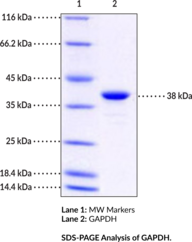Territorial Availability: Available through Bertin Technologies only in France
- Correlated keywords
- Escherichia HIF1 p 53 G3-PD HELS162eP HELS-162eP 162-eP
- Product Overview:
Glyceraldehyde-3-phosphate dehydrogenase (GAPDH) is an enzyme that catalyzes the conversion of glyceraldehyde-3-phosphate (Item No. 17865) to 1,3-bisphosphoglycerate during glycolysis and is involved in numerous additional cellular processes, including intracellular trafficking, receptor-mediated signaling, apoptosis, DNA repair, and the oxidative stress response.{54459,54460} It exists as a tetramer and is composed of an N-terminal domain, which contains binding sites for NAD+, phosphatidylserine, RNA, and glutathione, and a C-terminal catalytic domain.{54461} GAPDH is widely expressed and primarily localizes to the cytosol, where it has roles in glycolysis and intracellular trafficking.{54459,60077} It also localizes to the nucleus, mediating DNA integrity, gene transcription, and apoptosis, as well as to cellular membranes, where it has roles in membrane fusion and iron transport.{60077} GAPDH expression is increased by insulin, hypoxia-inducible factor-1 (HIF-1), p53, and nitric oxide (NO) and decreased by acetylated histones.{54459,54462} Aberrant mRNA and protein levels of GAPDH have been found in tumor biopsies from patients with a variety of cancers, including lung, renal cell, colorectal, or breast cancer.{60078} Cayman’s GAPDH (human, recombinant) protein consists of 346 amino acids and has a calculated molecular weight of 38 kDa.
Cayman Chemical’s mission is to help make research possible by supplying scientists worldwide with the basic research tools necessary for advancing human and animal health. Our utmost commitment to healthcare researchers is to offer the highest quality products with an affordable pricing policy.
Our scientists are experts in the synthesis, purification, and characterization of biochemicals ranging from small drug-like heterocycles to complex biolipids, fatty acids, and many others. We are also highly skilled in all aspects of assay and antibody development, protein expression, crystallization, and structure determination.
Over the past thirty years, Cayman developed a deep knowledge base in lipid biochemistry, including research involving the arachidonic acid cascade, inositol phosphates, and cannabinoids. This knowledge enabled the production of reagents of exceptional quality for cancer, oxidative injury, epigenetics, neuroscience, inflammation, metabolism, and many additional lines of research.
Our organic and analytical chemists specialize in the rapid development of manufacturing processes and analytical methods to carry out clinical and commercial GMP-API production. Pre-clinical drug discovery efforts are currently underway in the areas of bone restoration and repair, muscular dystrophy, oncology, and inflammation. A separate group of Ph.D.-level scientists are dedicated to offering Hit-to-Lead Discovery and Profiling Services for epigenetic targets. Our knowledgeable chemists can be contracted to perform complete sample analysis for analytes measured by the majority of our assays. We also offer a wide range of analytical services using LC-MS/MS, HPLC, GC, and many other techniques.
Accreditations
ISO/IEC 17025:2005
ISO Guide 34:2009
Cayman is a leader in the field of emerging drugs of abuse, providing high-purity Schedule I-V Controlled Substances to federally-licensed laboratories and qualified academic research institutions for forensic analyses. We are certified by ACLASS Accreditation Services with dual accreditation to ISO/IEC 17025:2005 and ISO Guide 34:2009.





